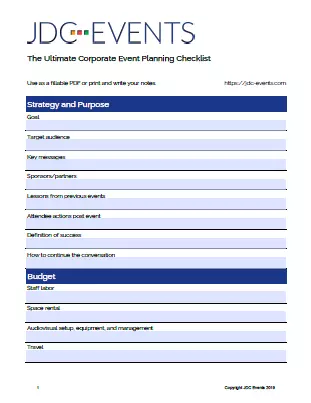Introduction
Planning a corporate event can be a daunting task, especially without a clear roadmap. But fear not! We've got you covered with this comprehensive corporate event planning checklist. Whether you're a seasoned event planner or a beginner, this guide will help you ensure that your resources are used effectively and that your event is a resounding success.
Pre-Event
Define the Strategy and Purpose
In today's world, events are designed to make a focused impact with measurable results. Before diving into the planning process, consider these key questions:
- What is the goal and purpose of your event?
- Who is your target audience and how well-connected are you to them?
- What has worked well in the past? What hasn't?
- What do you want attendees to do or feel after the event? What is the call to action?
- How will you define success?
- How will you continue to engage the audience beyond the event?
Determine a Budget
Creating a realistic budget upfront will help you avoid costly mistakes and surprises. Consider factors such as revenue goals, sponsorships, and potential fluctuations in attendance. Allocate budgetary resources for various aspects of the event, such as A/V production, decor, food and beverage, and transportation.
Set a Timeline
A detailed production timeline is essential to keep you on track and mitigate risks. Include key milestone dates and deliverables such as venue selection, marketing campaigns, speaker arrangements, and run-of-show preparation. Regularly update and share the timeline with your event team to ensure everyone is on the same page.
Source the Venue(s)
Choose a venue that aligns with your event's objectives and can accommodate the anticipated number of attendees. Consider location, meeting formats, on-site services, and local amenities. If necessary, secure a hotel room block for out-of-town guests.
Manage Travel/Accommodations
When managing hotel accommodations, clearly outline your parameters, including budget constraints and location preferences. Secure a contract with the hotel, negotiating provisions to minimize liability. Create a system to track and monitor travel arrangements for each attendee.
Design the Event
Craft a seamless attendee experience by designing the event's flow and atmosphere. Consider the floor plan, lighting, and other elements that contribute to the overall ambiance. And don't forget to pay attention to details that enhance the event's theme and messaging.
Create a Risk Mitigation Plan
Identify potential risks and develop a detailed plan to mitigate them. Consider worst-case scenarios and create a communication plan to address any issues that may arise. Share the plan with your event staff and ensure they are familiar with its contents.
Set Up Registration or Manage RSVPs
Determine the appropriate method for guest management based on your event type. Collect essential attendee information, track responses, and consider creating a registration site to streamline the process. A well-designed registration site can also serve as a communication tool throughout the event.
Recruit & Guide Speakers
Secure speakers early and address their logistical needs to ensure a smooth experience. Clarify expectations, provide necessary documentation, and establish clear lines of communication. Having a well-prepared and engaged speaker lineup will greatly enhance your event.
Plan the Menu
Food and beverage play a crucial role in the overall success of an event. Consider dietary restrictions, event format, and the number of attendees when planning your menu. Pay attention to presentation and timing to create a memorable dining experience.
Map Out A/V
Tailor your audiovisual setup to the specific needs and size of your event. Work closely with your A/V provider to design a run-of-show that accommodates all transitions and presents your content effectively. Test audiovisual setups thoroughly before the event begins.
Arrange Transcription, Interpretation & Translation
If you anticipate attendees who speak different languages, make arrangements for interpretation services. Consider sound insulation and sign language interpretation if necessary. Translation of materials may also be required. Choose translators proficient in the event's subject matter and ensure accurate communication.
Market the Event
Develop a comprehensive marketing plan to promote your event effectively. Leverage various channels such as social media, email, blogs, and industry media placements. Tailor your strategy based on participant personas and continuously evaluate its effectiveness.
Design Digital & Print Collateral
Create visually appealing materials to market your event and enhance the attendee experience. Design advertisements, flyers, handouts, and presentations that reflect your organization's brand identity.
During the Event
Manage Onsite Staff
Ensure that your onsite team is well-prepared and organized. Assign specific roles and responsibilities to your team members and provide them with a detailed briefing document. Regularly communicate and address any challenges that arise during the event.
Post-Event
Wrap Up Logistical and Financial Details
Tie up loose ends by returning unused materials, settling accounts with vendors, and reconciling the budget. Perform a comprehensive cost analysis to evaluate the event's financial success.
Conduct a Debrief
Bring your team together to discuss what worked well and areas for improvement. Document feedback for future reference and share it with relevant stakeholders. Use event data to inform your future planning and make adjustments as needed.
Follow Up with Attendees
Maintain engagement with attendees through various channels such as social media, email, and direct mail. Provide relevant content and opportunities for further engagement. Use attendee feedback to improve future events.
Conclusion
Planning a successful corporate event requires careful attention to detail and effective organization. By following this ultimate corporate event planning checklist, you'll be well-equipped to navigate the complexities of event planning and ensure a memorable experience for all attendees. Download our corporate event planning checklist to get started on your next event today!
 Image Source: Woman at computer planning and marketing a corporate event
Image Source: Woman at computer planning and marketing a corporate event

















